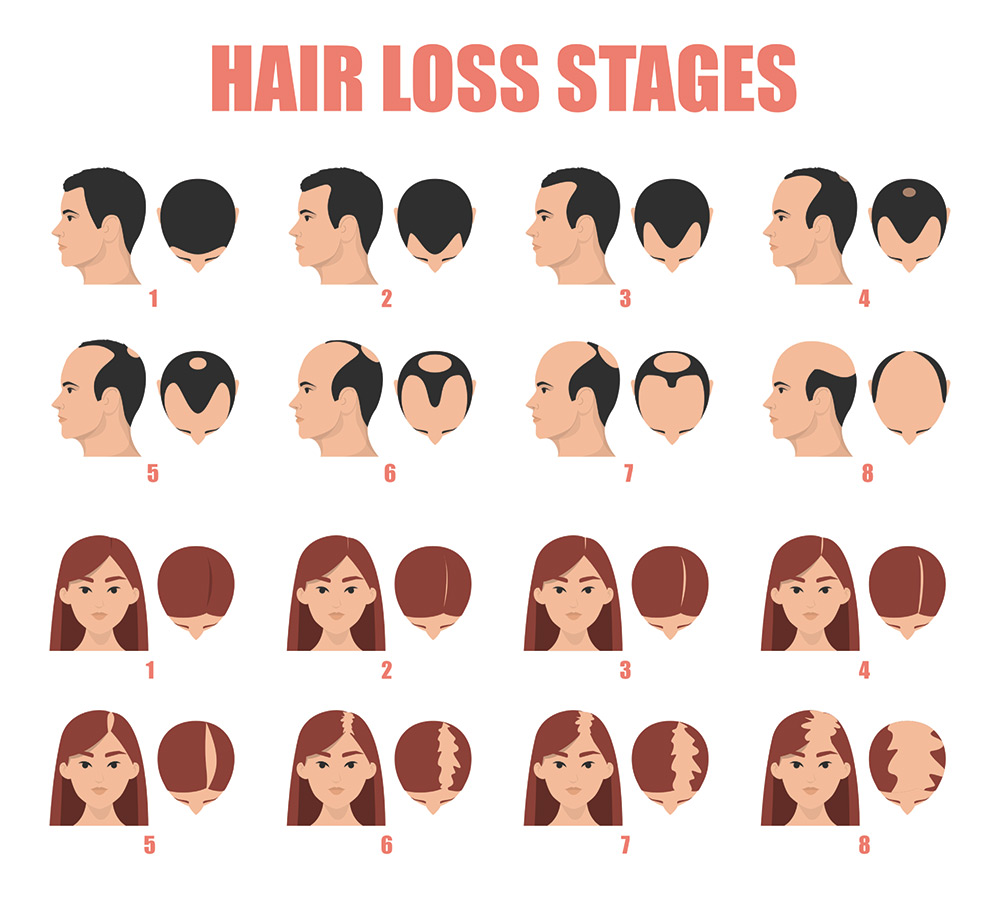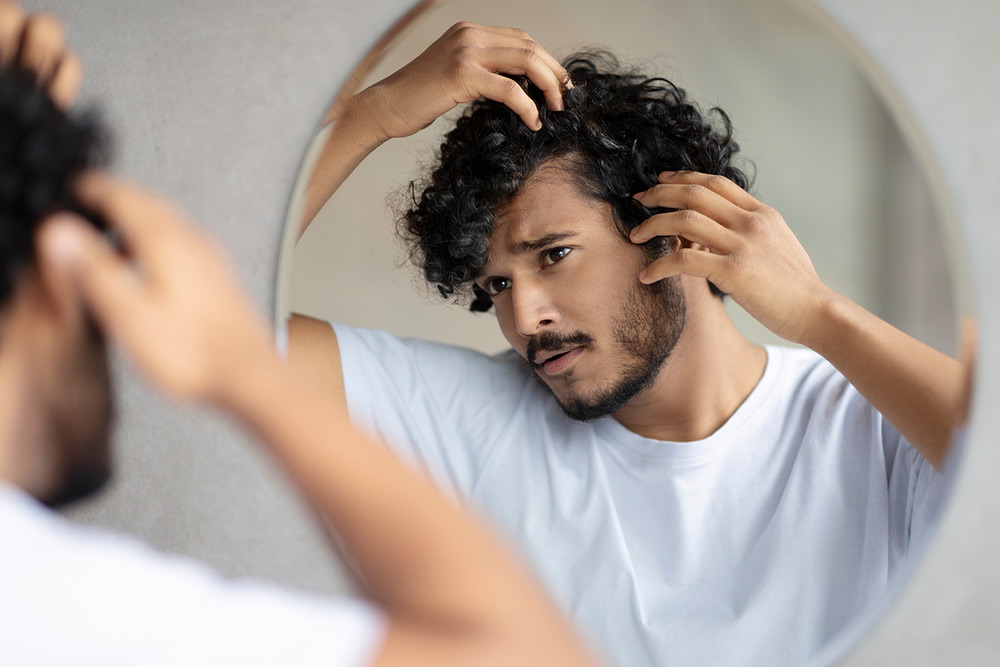Last updated on February 16, 2024
Experiencing an itchy scalp can be irritating, but when coupled with hair loss, it can raise concerns about underlying health issues. In this blog post, the medically-trained hair specialists at Hair doctors in Sydney explore the relationship between itchy scalp and hair loss, understanding the causes, common conditions, identification, management strategies, preventive measures, and the importance of seeking professional help.
Understanding Itchy Scalp
An itchy scalp can result from various factors, including dry scalp, dandruff, seborrheic dermatitis, scalp psoriasis, allergies, irritants, and fungal infections. It’s important to see a dermatologist or medically-trained hair specialist to treat the underlying condition, temporary hair loss, or permanent hair loss.
The Connection Between Scalp Itchiness and Hair Loss
Experiencing an itchy scalp and hair loss can be interconnected, often indicating an underlying scalp condition or inflammation. Persistent itching can lead to hair loss by causing damage to hair follicles and disrupting the hair growth cycle.
Additionally, conditions like psoriasis, alopecia areata, seborrheic dermatitis, or fungal infections can cause both itching and hair loss due to inflammation and follicle damage. Addressing the underlying cause of the itchy scalp is crucial to preventing further hair loss and promoting scalp health.
Common Conditions That Make Your Scalp Itchy and Can Cause Hair Loss
Several conditions often connect scalp itchiness and hair loss, including:
Telogen Effluvium
This condition occurs when a significant number of hair follicles prematurely enter the telogen (resting) phase, leading to increased shedding and noticeable hair loss.
Traction Alopecia
Caused by repeated tension or pulling on the hair follicles, often due to tight hairstyles or hair treatments, resulting in hair breakage and eventual hair loss.
Scalp Conditions (e.g., Scalp psoriasis, alopecia areata, seborrheic dermatitis
Inflammatory conditions affecting the scalp can cause itchy bumps, redness, and flakiness, leading to hair loss due to inflammation and damage to the follicles.
Fungal infection
Fungal infection of the scalp can cause itching and hair loss by inflaming follicles into itchy bumps and disrupting the hair growth cycle. Treating these infections promptly is crucial to alleviate symptoms and prevent further hair loss.
Hair dyes
Hair dyes contain harsh chemicals that can irritate the scalp, leading to itching and inflammation. Prolonged exposure to these chemicals may damage hair shaft and follicles, resulting in temporary loss of hair. Choosing gentler dye options and proper scalp care can minimise these risks.
These conditions can impact hair health by affecting the hair growth cycle or causing inflammation and damage to the scalp, causing permanent or temporary hair loss.
Symptoms You Should Watch for
Signs of both itchy scalp and hair loss include increased hair shedding, visible scalp or thinning hair, and persistent itching and discomfort. Seeking medical advice and professional evaluation is essential for an accurate diagnosis and appropriate treatment.
Managing Scalp Itchiness and Treating Hair Loss
Practical tips for managing scalp itching and preventing further hair loss include using appropriate medicated shampoo and treatments for specific scalp conditions, avoiding aggressive scratching and hair pulling, adopting a gentle hair care routine, and exploring treatments recommended by healthcare providers to support hair and scalp health, as well as stimulating hair cells. Addressing the underlying cause is crucial for effective management.
Preventive Measures and Scalp Care
Maintaining scalp health and preventing itchy scalp as well as hair loss involve regular washing and conditioning of the hair and scalp, using scalp-friendly products, protecting the hair and scalp from excessive heat and styling, and avoiding tight hairstyles that can stress the scalp. Keeping your scalp and hair healthy is essential for healthy hair follicles and supporting new hair growth.
Seeking Professional Help
Consulting a healthcare provider or dermatologist is essential for a proper diagnosis and personalised treatment plan. Various treatment options are available for addressing itchy scalp and hair loss, and early intervention can prevent further damage and promote hair regrowth when you develop scalp psoriasis, fungal infections, or any condition causing scalp itching and hair loss.
In conclusion, understanding the connection between itchy scalp and hair loss is crucial for effectively managing these concerns and maintaining scalp and hair health.
By identifying the underlying causes and implementing appropriate treatment and preventive measures, individuals can alleviate discomfort and promote hair regrowth. For effective treatment of hair concerns, visit medically trained hair doctors at Hair Doctors in Sydney.
With our expertise, state-of-the-art facilities, and personalised approach to hair loss treatments, we provide comprehensive solutions tailored to individual needs, ensuring optimal outcomes and restoring confidence in hair health.
FAQs
Why is my scalp itchy, and am I losing hair because of it?
Itchy scalp can result from various skin conditions like dryness, dandruff, peeling skin or fungal infections. While persistent itching can potentially lead to hair loss due to follicle damage, it’s essential to address the underlying cause.
Is it normal to have an itchy scalp with hair loss?
While occasional itching is common, persistent itching coupled with hair loss may indicate an underlying issue like scalp inflammation or hair follicle damage.
What scalp conditions can cause hair loss and itching?
Scalp conditions like psoriasis, seborrheic dermatitis, and fungal infections can lead to itching and hair loss due to inflammation and damage to the hair follicles.
How can I tell if my hair loss is due to scratching my itchy scalp?
Excessive scratching can damage hair follicles and disrupt the hair growth cycle, leading to increased shedding and hair loss, especially around the areas where scratching occurs.
Can hair loss from an itchy scalp be reversed?
Addressing the underlying cause of the itchy scalp, such as treating scalp conditions, avoiding aggressive scratching, and getting personalised hair loss treatments, can help prevent further hair loss and promote hair regrowth.
What can I do to relieve itching and prevent hair loss?
Using gentle shampoos, avoiding harsh hair treatments, maintaining scalp hygiene, and seeking treatment for scalp conditions can help relieve itching and treat hair loss.
When should I seek professional help for itchy scalp and hair loss?
If itching and hair loss persist despite home remedies or if there are signs of scalp inflammation or infection, it’s advisable to consult a medically-trained hair doctor or dermatologist for proper evaluation and medical treatment to prevent possible permanent hair loss.







